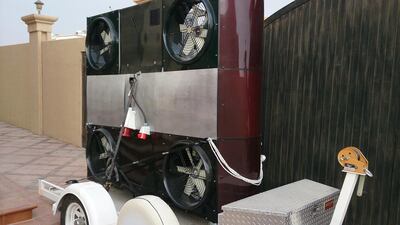Jessica Hill
Emirati Ahmed Ali Alshehhi, 35, has had his own workshop at his home in Ras Al Khaimah since he was in primary school.
In 2002, while studying electrical engineering at Valparaiso University in the United States, he proved his flair for innovation by beating 140 other contestants from all over the world in a robotics competition with his creation – a firefighting robot.
Two years later, while working as an engineer in Abu Dhabi, he began noticing newly built skyscrapers around him and their window cleaners – and the extreme conditions under which they work.
“It’s such a slow and risky process,” he says. “In Dubai, it’s the number-one source of industrial accidents. Inventors from all over the world have come up with several technologies to overcome this problem, but no technology has yet been able to widely penetrate the market safely and effectively.”
Alshehhi decided to have a go himself, designing an automated, unmanned cleaning system for washing the exterior surfaces and windows on high-rise buildings, with a very lofty goal.
“I am focusing my built-up skills towards innovation that shall positively serve humanity in a better way,” he explains.
He started by building and testing several mini prototypes. In 2011, with a view to turning his invention into a sustainable business, he hired AGIP to file his patent application in several countries where the technology has potential.
“After nearly three years I got my US patent and later the Canadian patent,” he says. “It is still ongoing in the UAE and elsewhere.”
As a full-time engineer, Alshehhi has found it difficult to find the time to obtain the resources he needs. The project has so far cost him about Dh750,000 out of his own pocket, but he has had support from Abu Dhabi Technology Development Committee for the US aspects of the process, and from his employer Takreer, or the Abu Dhabi Oil Refining Company.
Last year, he built and tested a full-scale functional prototype, with good results.
“Compared with manual cleaning, my system is eight to 10 times faster and also much safer, cheaper and more environmentally friendly,” he says. “I am now working on further improvements.”
The seeds of a great idea
Prof Ahmed Hussein and his research team from the College of Food and Agriculture at UAE University have been granted a European patent for their discovery that date pits degraded by fungi can be as effective as synthetic antibiotics in inhibiting a range of pathogenic bacteria in chickens. The UAE produces about 70,000 tonnes of the seeds every year, with date-processing factories selling off the unwanted pits at very low prices. The discovery creates the possibility of using them to treat pathogens such as salmonella, campylobacter, shigella and E-coli without expensive antibiotics. Prof Hussein says that “commercial antibiotics add to the cost of raising chickens for food, but the ‘waste product’ date pit could be fed to poultry as a supplement instead.”
A breath of fresh air
In August 2011, Hani A Abunameh from Amman filed a patent in the United States for a self-ventilating toilet.
Abunameh – whose day job is as a representative at Jordan’s Institution of Civil Engineers – has invented a standard toilet that gives the user the option of being able to ventilate the room. The invention features a system that sucks smelly gases directly from the toilet bowl before they can spread into the air, and blows them down the drain. A single intake nozzle sucks the gases from under the rear of the toilet seat, through an electric fan, and out into the auxiliary chamber’s external opening through an exhaust pipe that converts the chamber into a bottle water trap. Abunameh has just returned from a two-week business trip to China, where he says at least “two major manufacturing companies” expressed an interest in the concept. “My design does not add any cost to the production of a standard toilet commode,” he says. “The fan that does the venting is small in size, very cheap to produce, meets all international standards for hygiene and does not require any special fitting to be installed into any toilet room.”

